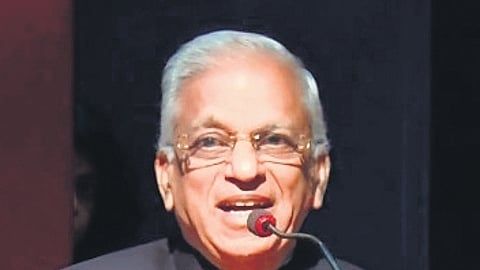

The Covid-19 lockdown unlocked the hidden potential of many of us. For Justice Shivaraj Patil, it became an opportunity to become a writer, going down the myriad memory lanes of his own long and illustrious life and penning an autobiography. The 400-page Time Spent Distance Travelled was released on January 21 and is also available in Kannada, titled Kaleda Kala Nadedha Doora.
There are already five biographies on Patil, three in Kannada and two in English, but this is the judge’s inspirational life story in his own words, as the poet laureate of Karnataka, the great Kuvempu, had said: “I shall unroll before you, O preceptor, my inner spirit, hiding nothing.”
At 84, Justice Patil has many glorious chapters in the book of life to leaf through and tell the world about. He was appointed as a justice of the Supreme Court of India in 2000 and since his retirement in 2005, has served as the acting chairperson of the Human Rights Commission of India, and as Lokayukta of the Karnataka government.
The many cases he fought as a lawyer and judgements he delivered as a judge of the Karnataka High Court and the Chief Justice of the Rajasthan High Court would make for essential reading not just for those in the legal profession but the regular reader with an interest in the country’s legal system. But what makes the biography stand apart is the story of plain, old hard work trumping life’s adversities and clear conscience and a solid set of morals as the guiding principles.
Justice Patil was not born to privilege, in fact, far from it, in a farmer family in a dusty village in Karnataka, studying by the light of a lantern in the village. “Poverty is not an abstract concept for me; I have experienced its hardships during my formative years.
I hail from a humble village in one of the most backward regions of India. I am the son of a farmer whose life was subject to the vagaries of nature. Drought was an ever present threat in the arid land of my birth,” writes Justice Patil. He had to once travel 32 kms through the night in a bullock cart to attend school on a Monday morning.
When he was in the 7th or 8th grade, he had just one shirt which he would was every day after school so that he could wear it in the next morning to school again.
The hardships did not leave him even during his college days when he struggled to pay for college and hostel and went hungry for many days. Yet he persevered and excelled in every examination to become a lecturer and the honorary principal of the same college he had attended as a student.
For most, that would have been the end of a remarkable career, but not for Justice Patil who went on to become a lawyer “without a shiny degree from Oxford or other foreign universities”. “All I possessed was an unwavering determination to succeed,” Justice Patil writes in his autobiography. It is this determination that would see him through in his illustrious career.
The other quality that would guide him through life is one he inherited from his mother, who died when he was only two. It is the quality of kindness and inclusivity, irrespective of caste, creed or social standing, that motivated Justice Patil to uphold humanitarian values in high offices.
“While I feel a deep ache when I heard stories about my mother, her principles inspired me to adopt them in my own life. Mother was unschooled but revered; she was a saintly woman like Hemareddy Mallamma, a guide and philosopher of the Veerashaiva Reddy community in Karnataka, who lived in the 14th century,” writes Justice Patil.